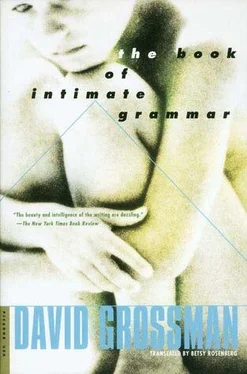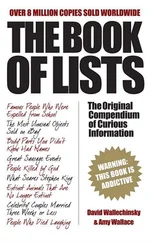David Grossman - The Book of Intimate Grammar
Здесь есть возможность читать онлайн «David Grossman - The Book of Intimate Grammar» весь текст электронной книги совершенно бесплатно (целиком полную версию без сокращений). В некоторых случаях можно слушать аудио, скачать через торрент в формате fb2 и присутствует краткое содержание. Год выпуска: 2002, ISBN: 2002, Издательство: Picador, Жанр: Современная проза, на английском языке. Описание произведения, (предисловие) а так же отзывы посетителей доступны на портале библиотеки ЛибКат.
- Название:The Book of Intimate Grammar
- Автор:
- Издательство:Picador
- Жанр:
- Год:2002
- ISBN:9781466803749
- Рейтинг книги:3 / 5. Голосов: 1
-
Избранное:Добавить в избранное
- Отзывы:
-
Ваша оценка:
- 60
- 1
- 2
- 3
- 4
- 5
The Book of Intimate Grammar: краткое содержание, описание и аннотация
Предлагаем к чтению аннотацию, описание, краткое содержание или предисловие (зависит от того, что написал сам автор книги «The Book of Intimate Grammar»). Если вы не нашли необходимую информацию о книге — напишите в комментариях, мы постараемся отыскать её.
The Book of Intimate Grammar — читать онлайн бесплатно полную книгу (весь текст) целиком
Ниже представлен текст книги, разбитый по страницам. Система сохранения места последней прочитанной страницы, позволяет с удобством читать онлайн бесплатно книгу «The Book of Intimate Grammar», без необходимости каждый раз заново искать на чём Вы остановились. Поставьте закладку, и сможете в любой момент перейти на страницу, на которой закончили чтение.
Интервал:
Закладка:
Aron stared at her in bewilderment. Giora was the cousin he went to stay with in Tel Aviv every summer, and after only a few weeks there, Aron fit in like a native; the year he was nine he taught the kids how to see angels: you press your eyeballs and wait till these sparks appear, some of which fade, some of which don’t, depending on how hard you press. And he told them about his secret ambition, to become the first Israeli bullfighter. And the following year he taught them Jerusalem stickball, Alambulik, and they taught him Red Rover at the swimming pool, and he taught them Chodorov’s save from the game against Wales, where the goalkeeper dives parallel to the ground and blocks a “howitzer” shot from right field, and for the entire month that Aron was there, whoever played goalie had to dive that way, even when the ball went into the corner, no one cared as long as it looked authentic. And last year he told them about the great Houdini, master of escape, who lived in America, and demonstrated how he could free his wrists and ankles from thickly knotted ropes; and when they didn’t believe him, he asked them to shut him inside the stinky cooling chest they found on the beach, and tie a rope around it and cover it with empty sugar sacks and stand back fifty paces, and when they were sure he’d suffocated in there, and started blaming each other for letting him do it, out jumped Aron, laughing and panting. The ideas your little Aronchik thinks up, Aunt Gucha wrote Mama, kineahora, you could grow fat just listening to him laugh.
And the Tel Aviv crowd introduced him to the sea. Of course he’d been to the beach at Ashkelon with his parents and their card friends lots of times, but it was always crowded there and full of tar, and they’d sit around telling dirty jokes and burping, and Aron didn’t like seeing people he knew half-naked in their bathing suits, and they had a policy called “Never turn your back on a wounded kebab”; in other words, never go home with leftovers in the cooler, and they forced Aron to eat himself sick. Papa was a terrific swimmer, you could always tell he was in the water by his powerful kicking and splashing and the pranks heplayed, like diving down and attacking their card friends, trying to pull their trunks down, or to drown their wives, who would float up shouting and squealing; and Aron was very careful never to go in the water while Papa was there, he had secretly decided that only one of them should be in the water at a time; besides, he suspected Papa liked to piss in the sea, and even when Aron came out and sat on the sand, he felt as if Papa’s piss had followed him; and once, in the middle of a tranquil swim, far away from the crowd, just him and the open sky, he had a sudden apprehension that something was chasing him, he knew it couldn’t be, that he was imagining things, but still he felt it slithering beneath the waves; at first he thought Papa was down there, trying to scare him, which made him panic and kick and splash and swallow water, but then something tough and rubbery circled his waist like a sinewy arm, or the trunk of a giant elephant, trying to pull him down, and when he crawled up on the shore, he knew he hadn’t imagined it, that something very strange had happened in the sea, and Mama and Papa’s card friends ran over to ask what happened, did you forget how to swim, and they wrapped a towel around him and rubbed his shoulders, and he searched for Papa but couldn’t see him, he was reading the paper under a beach umbrella, and he didn’t even look up when Aron shuffled over wrapped in a towel and sat shivering beside him and said, It was just a cramp, and when Papa didn’t answer, Aron sobbed and said, It could have happened to anyone, but still Papa wouldn’t look at him, he merely rolled over with his face in the paper.
The Tel Aviv kids took him out to a secluded beach with nothing but moon rocks everywhere, and they taught him how to swim for real, not doggy-paddle Jerusalem-style, and how to dive underwater with his eyes open, and in the sea he felt his soul grow boundless. At night in his sleep on the narrow porch at Gucha and Efraim’s, he could hear the swishing water beyond the mosquito nets, and he floundered and kicked in deep oblivion, drifting in and out of sleep with the rockabye flow of the tides. And he also dreamed awake: about building an underwater train, or organizing a marine corrida, with sharks in the ring instead of bulls; and he conducted experiments with burning sand, trying to turn it into glass like the ancient Phoenicians, and he sent letters over the waves to survivors on desert islands in sealed bottles of Tempo soda, and he tried to lure the mermaids out of the sea. Every summer the kids fell in love with the sea again, thanks to him. And hisskin grew tan, his hair golden. Giora was a few months younger than he was, shy in public and moody at home, and Aunt Gucha hinted in her weekly letters to Jerusalem that maybe Giora was eppes a little bit jealous of Aronchik, who had won over all his friends. Well, never mind, she wrote her sister Hinda, he’ll simply have to learn to live with it, this only child of ours who’s used to being treated like a king.
Last year, as the summer vacation was drawing to a close, Aron and the kids built a raft. For three whole weeks they worked on it from morning to night, making models according to Aron’s specifications, trying out different pieces of wood for the masts, stealing sheets from laundry lines for sails. The day before the official launching they finished early and went for a swim. All of a sudden a boat raced past them, slicing the waves like a sharp gray knife and barely missing them. The children huddled together in amazement: no boat had ever come this way before. There were two people aboard: a pretty woman and a much older man with a bony face and sallow skin. The man pointed at them and said something to the woman in a gravelly voice with a foreign accent. The woman held the hem of her green dress out to keep it from getting wet and smiled at the sunburned children gathered in the water like a school of fish, though maybe she was smiling at something else, maybe she didn’t really see them, maybe she was the old man’s prisoner, Aron worried, and he was holding her there against her will. Suddenly the man took a coin out of his wallet and tossed it over the side of the boat. The children stared in bewilderment. One of them quietly cursed the man. The man laughed hoarsely and bared his rotten teeth, and the woman laughed with him, disappointing Aron, who realized now that she was a willing accomplice. Then the man took out another coin and said, “Dis aprecious! Worth amuch!” and slyly flicked it into the water. It twirled in the air as it fell and they all dived after it under the shadow of the boat. Aron found it spinning slowly to the bottom. He caught it between his lips and pressed it under his tongue. By the time he rose to the surface the boat was gone. “Whenever you find something, hide it in your pocket and keep your mouth shut,” Mama always said, and once he’d found a tennis ball in the valley with Gideon and he disobeyed and told Gideon the ball belonged to both of them, and felt triumphant. But now for some reason he kept quiet and slipped the coin down his swimsuit at the first opportunity, where it sent an eerie shiver to his private parts.
Then the wind blew up and swelled the waves. The sea looked murky. Aron jumped to his feet and suggested that they launch the raft right away. The children hesitated, afraid the current would carry them out too far. Aron knew they were right but coaxed them anyway, to snap them out of their present gloom. He cajoled them with descriptions of the maiden voyage, how the raft would carry them across the waves, till even the skeptics were reduced to silence, and when dark clouds gathered on the horizon and he saw it was dangerous to venture out, the important thing was still to lift their spirits, to banish the dread they felt in their hearts. But they were not swayed by his eloquence. They kicked the sand and shifted their weight and rubbed their necks and looked away. He had suddenly become a stranger again, the long speech had misfired, he was too articulate for them, and their coldness cut around him like a pair of scissors and tore him out of the sunny picture. And then he gulped and asked them to wait and ran up the hill to the kiosk. With his own money, not the coin, he bought a bottle of real cognac and returned to them proudly, carrying the trophy. Let’s go, let’s launch her, he exulted, with an anxious undertone in his voice, but his radiant smile convinced them just the same.
Читать дальшеИнтервал:
Закладка:
Похожие книги на «The Book of Intimate Grammar»
Представляем Вашему вниманию похожие книги на «The Book of Intimate Grammar» списком для выбора. Мы отобрали схожую по названию и смыслу литературу в надежде предоставить читателям больше вариантов отыскать новые, интересные, ещё непрочитанные произведения.
Обсуждение, отзывы о книге «The Book of Intimate Grammar» и просто собственные мнения читателей. Оставьте ваши комментарии, напишите, что Вы думаете о произведении, его смысле или главных героях. Укажите что конкретно понравилось, а что нет, и почему Вы так считаете.












